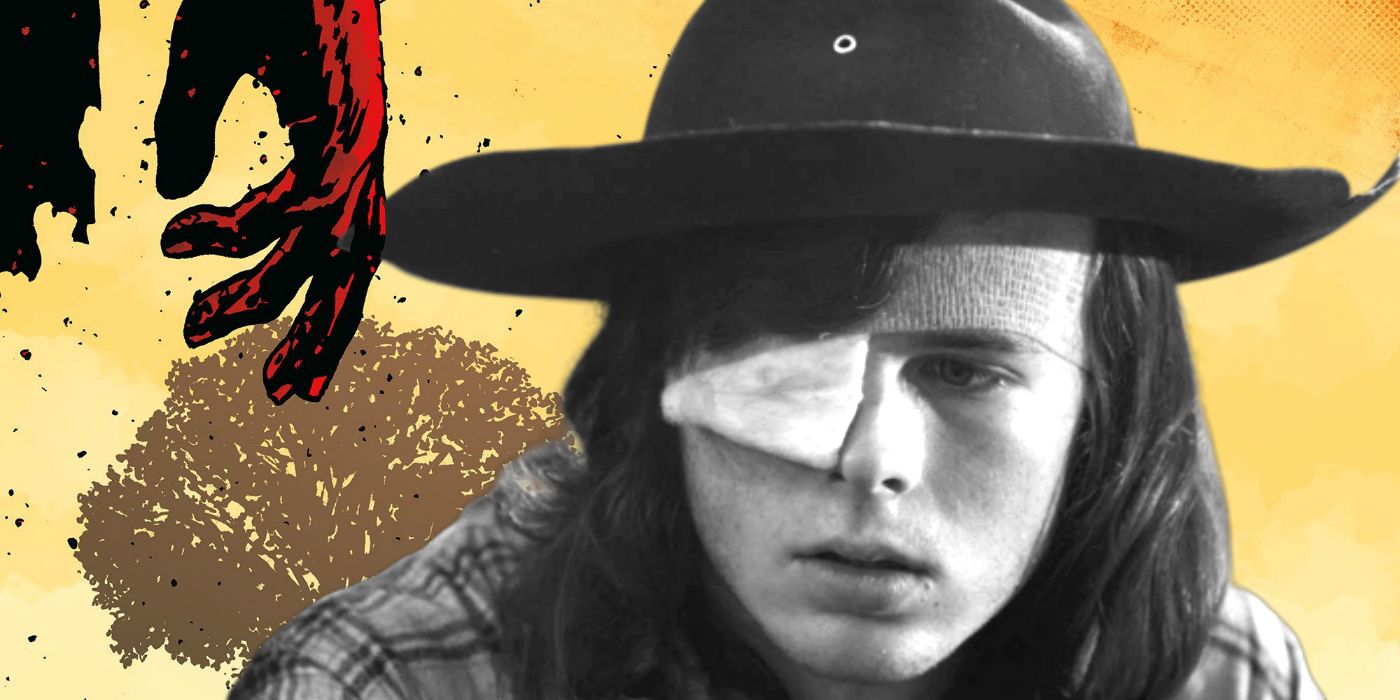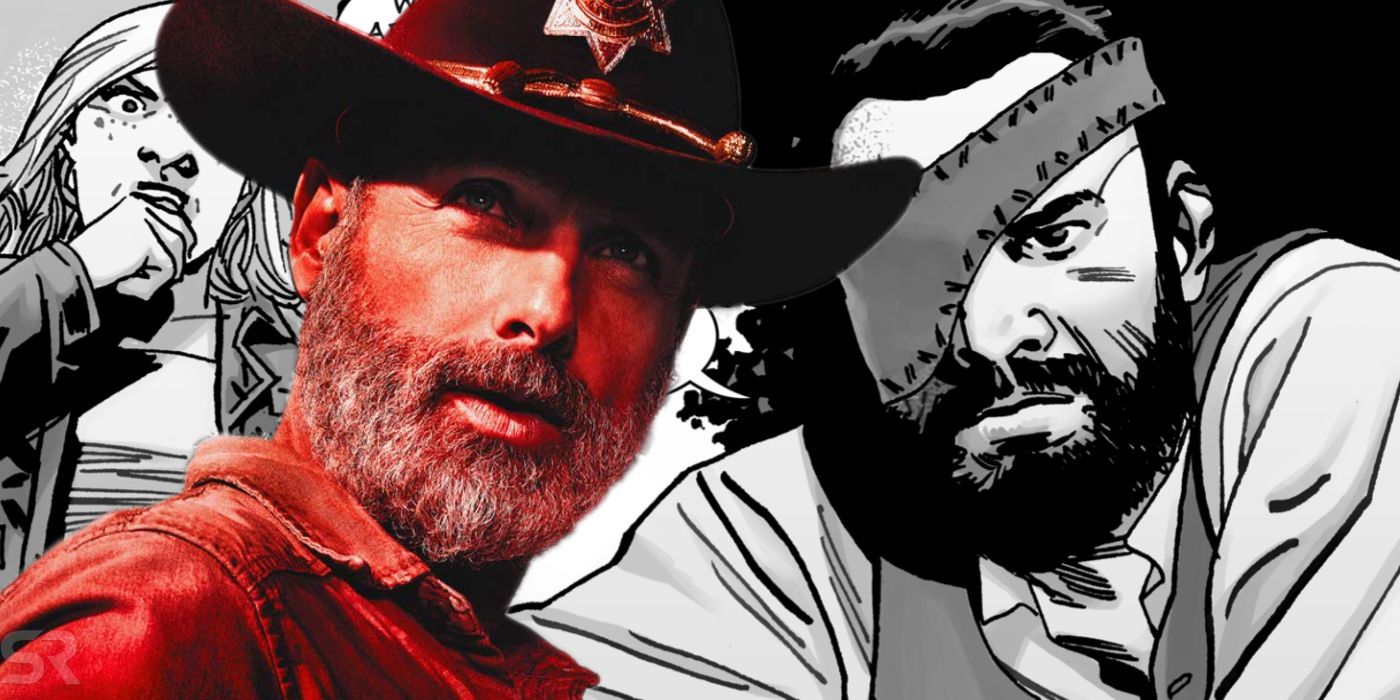Warning! SPOILERS ahead for The Walking Dead's final issue.
The Walking Dead TV show needs to have a different ending to the comics. Robert Kirkman brought The Walking Dead graphic novels to a surprising conclusion last month, and in doing so showed that the TV series will have to go down another own path for its own climax.
The Walking Dead comics ended with issue #193, and the fact it was the final installment of TWD was only announced the day before it released, making it a major shock to fans, and leading to AMC releasing a statement to reassure viewers of the TV show that it wasn't going anywhere. Rick Grimes was killed off in The Walking Dead #192, but Kirkman had a final twist in store for his readers, which started with a massive time jump.
Picking up decades in the future, it continues the story of Carl Grimes, who is now an adult and lives on a farm with his wife, Sophia, and their daughter Andrea. Hershel Greene, the son of Maggie and Glenn, has made a traveling roadshow of remaining 'roamers', which Carl takes issue with. He kills the zombies and the case goes to the High Court, where Michonne - now the Judge - rules in his favor. It features a passing look at various characters, and ends with Carl reading Andrea a book that details all the heroic acts of Rick throughout The Walking Dead. It's an unexpectedly happy and sentimental ending, but it's one The Walking Dead TV show can't repeat.
Walking Dead Is Already Different From The Comics
The Walking Dead TV show has often been more inspired by the source material than it has closely followed it. Although it hits some of the comic's major beats, it often puts its own spin on them: Negan killing Glenn becomes Negan killing Glenn and Abraham; the Governor beheads Hershel instead of Tyreese. It's also made some major wholesale changes, such as allowing Rick to keep both of his hands, avoiding Carol's death, killing off Andrea early on, and, of course, having Carl die in season 8.
All of that and more amounts to The Walking Dead TV show being very different from the comics, no matter how much it might loosely follow the same story structure. These changes, both big and small, have a butterfly effect that means further changes later in the series are inevitable. No Andrea means Rick ends up with Michonne, which then changes her story, and Ezekiel's, and so on. Killing Carl meant that not only was much of his story lost, but a major time jump was introduced to move past Rick and allow an older Judith Grimes to appear.
On top of that, The Walking Dead TV show also made the decision to keep Rick alive after Andrew Lincoln decided to leave the series, thus separating him from the main group, and keeping the rest of that story for his upcoming trilogy of TWD movies rather than the TV series.
Why TWD TV Show Can't End The Same Way As The Comics
There are a number of differences with The Walking Dead that mean it can't have the same ending as the comics. Rick's current position is a major part of this, because so much of the ending comes from his death. Even if Rick does die at the end of TWD, it's now more likely to be in the movies than the TV series, which then changes how the show's conclusion can build upon that because it's not as natural a progression.
Compounding that is the fact The Walking Dead has long-since killed off Carl, around whom the final issue itself is built. That seemed like a mistake at the time, since the relationship between Rick and Carl should be the crux of the series, and it looks worse now given how central he is to The Walking Dead's comic ending, but it goes beyond these two. Carl's partner, Sophia, is long gone too, while there are few people around in the TV show who'd name a child after Andrea. The comic book gives Negan something of a sad, isolated ending following his previous banishment from Alexandria, but given how The Walking Dead TV show has already started rehabilitating him in a big way, that seems less likely to happen now.
Maggie might well end up as President of the Commonwealth on the TV show, like she is revealed to be in The Walking Dead #193, but since she's already left the Hilltop behind it's entirely possible she'll already be in that position - or close to it - by the time we next see her in season 10, assuming a deal for Lauren Cohan's return can be finalized. Michonne is a judge in the comics, but Danai Gurira is set to leave TWD next year. There's also the fact that The Walking Dead TV show already did something similar, following up Rick's supposed death with a time jump that continues the story with people trying to honor his legacy. That's similar to the ending of the comic, except on the page it stops short of fully continuing the story without Rick. That's what the TV show is doing, meaning that it's gone further than the comic in that regard already, and so such an ending wouldn't have the same impact. Finally, the ending in The Walking Dead #193 finds that roamers, while still in existence, are no longer much of a threat, an endpoint it's tricky to achieve in a TV show when it'll be outlived by various TWD spin-offs.
How The Walking Dead Could End Instead
It's entirely possible that The Walking Dead will still attempt to tie things up in a similar fashion to the comics. If they swap out Carl for either Judith or Rick Jnr, and have an even bigger time jump, then they could mirror some of the events of The Walking Dead #193, but that contains a few problems. The comic issue worked so well as an epilogue because it came directly after Rick's death, and while it's not unimaginable that Lincoln returns to the TV show for an episode or two, the movies are more likely to resolve his story. There's also the fact that seeing Carl as an older man telling the story of Rick is powerful not only because we've seen so much of their relationship, but also witnessed Carl grow into a young man. Those things aren't there with Judith or RJ.
The Walking Dead should instead strive to deliver its own ending, given the many differences to the comics at this point anyway. They could still incorporate certain elements, like Maggie being President of the Commonwealth, but since there are so many characters alive who should be dead and vice versa (and in Daryl Dixon, someone who never existed at all in the comics), it'd be better serving them and its own story rather than the comics.
What The Walking Dead should look to take from the comics is the tone. The Walking Dead might not have the exact same ending, and it doesn't need another time jump, but it could still deliver a conclusion to the story that's altogether hopeful. The ending is a couple of years off, and if it can get to a point that is able to leave the future for Rick's remaining kids looking a lot brighter - albeit perhaps slightly more ambiguous - then that would still be a fitting way to go out and honor his legacy. The Walking Dead could hint at the walkers dying out, and have happy endings for the likes of Daryl and Carol with them finding a sense of peace. The Walking Dead doesn't need the same ending as the comics, but simply a good one for the story it's telling.




